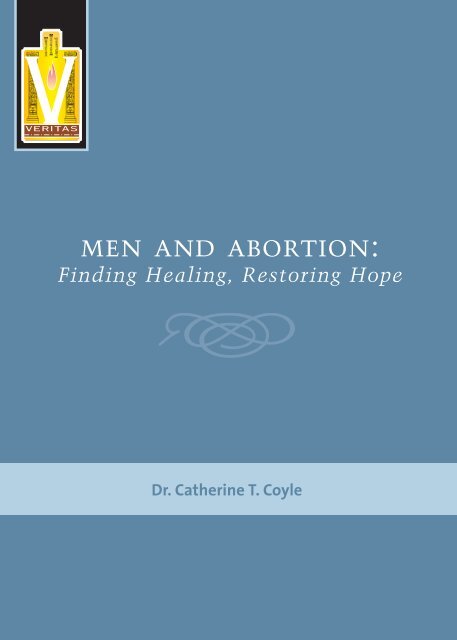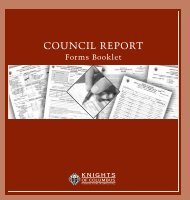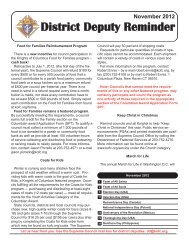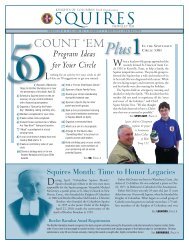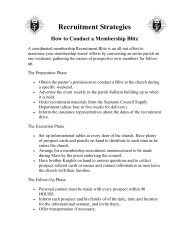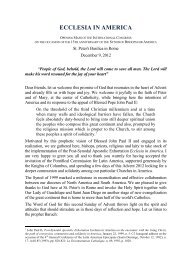MEN AND ABORTION: - Knights of Columbus, Supreme Council
MEN AND ABORTION: - Knights of Columbus, Supreme Council
MEN AND ABORTION: - Knights of Columbus, Supreme Council
You also want an ePaper? Increase the reach of your titles
YUMPU automatically turns print PDFs into web optimized ePapers that Google loves.
VVERITAS<br />
<strong>MEN</strong> <strong>AND</strong> <strong>ABORTION</strong>:<br />
Finding Healing, Restoring Hope<br />
Dr. Catherine T. Coyle
The <strong>Knights</strong> <strong>of</strong> <strong>Columbus</strong> presents<br />
The Veritas Series<br />
“Proclaiming the Faith in the Third Millennium”<br />
Men and Abortion:<br />
Finding Healing, Restoring Hope<br />
BY<br />
DR. CATHERINE T. COYLE<br />
General Editor<br />
Father Juan-Diego Brunetta, O.P.<br />
Director <strong>of</strong> the Catholic Information Service<br />
<strong>Knights</strong> <strong>of</strong> <strong>Columbus</strong> <strong>Supreme</strong> <strong>Council</strong>
© 2009 by <strong>Knights</strong> <strong>of</strong> <strong>Columbus</strong> <strong>Supreme</strong> <strong>Council</strong>. All rights reserved.<br />
Cover: 2009 <strong>Knights</strong> <strong>of</strong> <strong>Columbus</strong> <strong>Supreme</strong> <strong>Council</strong>. All rights reserved.<br />
No part <strong>of</strong> this book may be reproduced or transmitted in any form or by any means,<br />
electronic or mechanical, including photocopying, recording, or by information<br />
storage and retrieval system, without permission in writing from the publisher.<br />
Write:<br />
Catholic Information Service<br />
<strong>Knights</strong> <strong>of</strong> <strong>Columbus</strong> <strong>Supreme</strong> <strong>Council</strong><br />
PO Box 1971<br />
New Haven CT 06521-1971<br />
cis@k<strong>of</strong>c.org<br />
www.k<strong>of</strong>c.org/cis<br />
203-752-4267<br />
203-752-4018 fax<br />
Printed in the United States <strong>of</strong> America
CONTENTS<br />
INTRODUCTION. . . . . . . . . . . . . . . . . . . . . . . . . . . . . . . . . . . . . 5<br />
<strong>MEN</strong> <strong>AND</strong> <strong>ABORTION</strong>: WHY SHOULD WE CARE? . . . . . . . . . . . . 5<br />
<strong>MEN</strong> <strong>AND</strong> <strong>ABORTION</strong>: DECISION-MAKING . . . . . . . . . . . . . . . . . 6<br />
<strong>MEN</strong> <strong>AND</strong> <strong>ABORTION</strong>: THE CONSEQUENCES . . . . . . . . . . . . . . . . 7<br />
TOM’S STORY . . . . . . . . . . . . . . . . . . . . . . . . . . . . . . . . . 7<br />
DAVID’S STORY . . . . . . . . . . . . . . . . . . . . . . . . . . . . . . . . 8<br />
BILL’S STORY. . . . . . . . . . . . . . . . . . . . . . . . . . . . . . . . . . 9<br />
JACK’S STORY . . . . . . . . . . . . . . . . . . . . . . . . . . . . . . . . . 9<br />
<strong>MEN</strong> <strong>AND</strong> <strong>ABORTION</strong>: THE RESEARCH. . . . . . . . . . . . . . . . . . . 10<br />
<strong>MEN</strong> <strong>AND</strong> <strong>ABORTION</strong>: HELPING <strong>MEN</strong> TO HEAL . . . . . . . . . . . . 12<br />
THE PROCESS OF FORGIVENESS . . . . . . . . . . . . . . . . . . . . . . . . 15<br />
UNCOVERING PHASE. . . . . . . . . . . . . . . . . . . . . . . . . . . 16<br />
DECISION PHASE. . . . . . . . . . . . . . . . . . . . . . . . . . . . . . 20<br />
WORK PHASE. . . . . . . . . . . . . . . . . . . . . . . . . . . . . . . . 21<br />
OUTCOME PHASE . . . . . . . . . . . . . . . . . . . . . . . . . . . . . 23<br />
SELF-FORGIVENESS . . . . . . . . . . . . . . . . . . . . . . . . . . . . . . . . . 25<br />
<strong>MEN</strong> <strong>AND</strong> <strong>ABORTION</strong>: PREVENTION. . . . . . . . . . . . . . . . . . . . . 25<br />
ABOUT THE AUTHOR . . . . . . . . . . . . . . . . . . . . . . . . . . . . . . . 27<br />
RESOURCES . . . . . . . . . . . . . . . . . . . . . . . . . . . . . . . . . . . . . . . 28<br />
- 3 -
Introduction<br />
Since January <strong>of</strong> 1973, nearly 50 million abortions have<br />
occurred in the United States. In fact, abortion has become one <strong>of</strong><br />
the most common surgical procedures in America. Approximately<br />
one-third <strong>of</strong> U.S. women will have experienced elective abortion by<br />
the age <strong>of</strong> 45 and this includes women who identify themselves as<br />
Catholic (27%) and Protestant (43%). 1 Each abortion involves both<br />
a man and a woman and <strong>of</strong>ten leaves them feeling wounded and<br />
confused. Men and women may feel regret immediately after<br />
abortion or they may not realize the negative impact <strong>of</strong> abortion on<br />
their lives until months or years later. These men and women need<br />
our understanding and our compassion.<br />
Men and Abortion: Why should we Care?<br />
At conception, a unique, genetically complete individual<br />
human begins his or her development. No subsequent child created<br />
will be the same. Therefore a distinctive, irreplaceable human being<br />
is involved in each pregnancy and in every abortion.<br />
Each first pregnancy entails not only the creation <strong>of</strong> a unique,<br />
individual human being but also <strong>of</strong> a mother and a father. For it is<br />
procreation which propels a man or a woman into the new role <strong>of</strong><br />
parent. Although our legal system and society do not consistently<br />
acknowledge the fathers <strong>of</strong> children yet in the womb, those men are<br />
no less ‘fathers’ than those whose children are already born. As has<br />
been so eloquently stated, “Whether or not the creator-father<br />
continues as parent, indeed, his part in the creation <strong>of</strong> a new life<br />
- 5 -
signifies an elemental reality which no legal, social, or medical act<br />
(such as abortion) can truly alter…. It is the biological act which<br />
sets in motion the forces that will in time alter consciousness, selfperception,<br />
and even attitudes toward the outside world.” 2 Surely<br />
the realization <strong>of</strong> having created one’s own child cannot be erased by<br />
abortion. Although abortion ends the life <strong>of</strong> a child, it cannot kill a<br />
man’s sense <strong>of</strong> himself as a father.<br />
Often abortion results in multiple losses: the loss <strong>of</strong> the child,<br />
<strong>of</strong> the relationship, <strong>of</strong> self-worth, and <strong>of</strong> hope for the future.<br />
Abortion debases fatherhood as it violates a man’s instinct to protect<br />
and care for those he loves. To care about this issue is to care about<br />
ourselves and about the welfare <strong>of</strong> our fellow human beings.<br />
Men and Abortion: Decision-Making<br />
Some men actively encourage their partners to abort. Some<br />
abandon their partners or threaten to do so and therefore indirectly<br />
encourage abortion. Although the stereotype <strong>of</strong> the callous male<br />
abandoning his partner continues to be promoted, there are<br />
frequently other circumstances leading to abortion decisions. For<br />
example, there are men who are not aware <strong>of</strong> a partner’s abortion<br />
until after it occurs. Still other men <strong>of</strong>fer support <strong>of</strong> some kind<br />
which may or may not include a commitment to a long-term<br />
relationship. Some men oppose abortion and make their views clear<br />
but, ultimately, they are at the mercy <strong>of</strong> their partners’ decisions.<br />
Finally, many men concede to the <strong>of</strong>ten promoted view that<br />
abortion decisions belong solely to women and so defer those<br />
decisions to their female partners.<br />
Regardless <strong>of</strong> one’s position on the issue <strong>of</strong> abortion, it seems<br />
fair to say that abortion decisions are painful and difficult decisions<br />
which bring lasting consequences.<br />
- 6 -
In spite <strong>of</strong> the gravity <strong>of</strong> such decisions, choices need to be<br />
made within a short time period and <strong>of</strong>ten with limited<br />
information. While abortion providers have frequently been<br />
criticized for failing to adequately inform their clients, that is not<br />
the only failure in communication. Too <strong>of</strong>ten, the men and women<br />
themselves do not adequately communicate their fears and desires<br />
and, as a result, an abortion decision is made which neither partner<br />
is satisfied with. Men tend to withhold their thoughts and desires<br />
concerning pregnancy outcome and, instead, yield the decision<br />
entirely to their partners as they perceive such behavior as<br />
“supporting” them. While the research on men and abortion is<br />
limited, a consistent observation is that men will repress their own<br />
emotions because they believe that is the most appropriate way to<br />
care for their partners. Ironically, many women report that had they<br />
received an assurance <strong>of</strong> support from their partners, they would<br />
have chosen to carry their pregnancies to term. Sadly then, the<br />
decision to abort is <strong>of</strong>ten not what either party wants but is the<br />
result <strong>of</strong> a failure <strong>of</strong> communication between men and women<br />
trying to cope with the crisis <strong>of</strong> unplanned pregnancy.<br />
Men and Abortion: The Consequences<br />
While not all men seem to suffer greatly after abortion, some<br />
surely do. Whether married or single, in casual or committed<br />
relationships, some men have a very difficult time after abortion as<br />
the following stories illustrate:<br />
Tom’s Story<br />
Tom was a 19-year old college student when he met Laurie at<br />
school. They began dating and their relationship soon became<br />
intimate. This was Tom’s first sexual relationship. Six months after<br />
they met, Laurie became pregnant. They were frightened but also<br />
excited. They discussed marriage and decided that it was the right<br />
choice for them. Tom was elated. He knew they would have some<br />
- 7 -
financial challenges and that their parents would need some<br />
convincing but Laurie was the woman <strong>of</strong> his dreams and he looked<br />
forward to sharing a life and a family with her. Two weeks later,<br />
Laurie informed Tom that she had changed her mind and scheduled<br />
an appointment for an abortion. Tom was devastated. He begged<br />
her to reconsider and even <strong>of</strong>fered to raise the child himself but<br />
Laurie would not be swayed from her decision. She kept the<br />
appointment and, within the next month, her relationship with<br />
Tom deteriorated. They never spoke about the pregnancy or the<br />
abortion and finally stopped communicating altogether. Tom<br />
became depressed and dropped out <strong>of</strong> school.<br />
Tom lost a child, a woman he believed he would spend a<br />
lifetime with, and his hopes for the future. He lost confidence in<br />
relationships and, for a period <strong>of</strong> time, chose to become involved in<br />
a homosexual relationship believing that would be safer than<br />
getting involved with another woman.<br />
David’s Story<br />
David and Jenny dated during high school and married two<br />
years after graduation. They were married for seven years when<br />
Jenny became pregnant with their third child. Although the<br />
pregnancy was not planned, David enjoyed being a father and<br />
looked forward to having another child. Jenny seemed somewhat<br />
ambivalent about the pregnancy but never gave David any<br />
indication that she would end it. During the next month, while<br />
David was out <strong>of</strong> state for army reserve training, Jenny had an<br />
abortion. David was stunned that his wife would make such a<br />
decision without including him. According to David, his marriage<br />
ended the day he found out about the abortion. As he said, “There<br />
was just no trust left in our marriage.” David suffered from<br />
persistent thoughts about his lost child. He began drinking heavily<br />
in an effort to numb his pain.<br />
- 8 -
Bill’s Story<br />
Bill was 31 when he met Ann. Both <strong>of</strong> them were working for<br />
a large accounting firm in Chicago. Ann was a new college grad and<br />
Bill became her mentor at work. Their business relationship soon<br />
became personal and intimate. A few months later, Ann discovered<br />
that she was pregnant. When she approached Bill about the<br />
situation, he encouraged her to have an abortion and <strong>of</strong>fered to<br />
accompany her to the clinic and to pay for all <strong>of</strong> the medical costs.<br />
The appointment was made and Bill kept his word, taking Ann to<br />
the clinic and staying with her at her apartment for the next 24<br />
hours. During that time, Ann was inconsolable, alternating<br />
between crying and angry outbursts directed at Bill. By the second<br />
day, Bill was eager to get back to the <strong>of</strong>fice and away from Ann. In<br />
the following weeks, they deliberately avoided each other at work.<br />
Eventually Ann quit her job and moved back to her hometown. Bill<br />
dated several other women including other co-workers. While most<br />
<strong>of</strong> those relationships included sex, none <strong>of</strong> them provided<br />
emotional intimacy and Bill found himself feeling vaguely uneasy<br />
and unhappy much <strong>of</strong> the time. He was especially uncomfortable<br />
when he went home for a family holiday gathering and spent time<br />
with his married sister who had a two- year-old son and was<br />
pregnant with her second child.<br />
Jack’s Story<br />
Jack and Lisa were in a casual, sexual relationship for six<br />
months when Lisa became pregnant. Jack did not hesitate to express<br />
his desire for abortion and Lisa seemed to be in agreement. Within<br />
the first few weeks after the abortion, Jack and Lisa began to<br />
distance themselves from each other. They communicated less,<br />
spent less time together, and finally they mutually agreed to end the<br />
relationship.<br />
- 9 -
After the abortion but prior to their break-up, Jack<br />
experienced impotence on more than one occasion. He had no doubt<br />
that his sexual difficulty was related to the abortion. Having been<br />
abandoned by his own father when he was an infant, he had now<br />
come to see himself as an even worse father than his own. One year<br />
after the abortion, he sought counseling for anxiety, depression,<br />
intrusive thoughts, and nightmares which he attributed to his<br />
abortion experience.<br />
As these stories reveal, men may struggle with guilt,<br />
depression, anniversary reactions, frequent thoughts about the lost<br />
child, social isolation, disturbed sleep patterns, nightmares,<br />
difficulty being near infants or children, fear <strong>of</strong> relationships, sexual<br />
dysfunction, and drug or alcohol abuse after abortion. A sense <strong>of</strong><br />
pervasive helplessness may contribute to lowered self-esteem as well<br />
as to problems with work or school. Anger may be tenacious and<br />
misdirected at others. Grief is <strong>of</strong>ten pronounced and complicated<br />
due to men’s tendency to stifle their emotions and because our<br />
society, which does not recognize men’s parental rights in regard to<br />
abortion decisions, is even less inclined to recognize their right to<br />
grieve after abortion.<br />
Men and Abortion: The Research<br />
There is very little scientific research concerning the effects <strong>of</strong><br />
abortion on men. A recent review <strong>of</strong> that research located only 28<br />
published studies. 3 Common findings among these studies included<br />
the following:<br />
1) Men tend to repress their own emotions when they learn<br />
that their partners are unexpectedly pregnant, when the<br />
abortion decision is being made, and after the abortion is<br />
performed. Men have stated that they believe this is what<br />
they should do in order to support their partners. In<br />
addition, the abortion decision is <strong>of</strong>ten passively yielded to<br />
- 10 -
the woman. These beliefs and behaviors are likely due to<br />
the fact that women are the ones carrying the physical<br />
burden <strong>of</strong> pregnancy and also because abortion is<br />
consistently portrayed as a ‘women’s issue’ by the media,<br />
feminist groups, and politicians.<br />
2) Relationships are stressed by abortion. Reports <strong>of</strong><br />
relationship failure following abortion vary from 25% to<br />
70%. 4,5 Some men will withdraw from relationships,<br />
particularly intimate relationships with women. Others may<br />
become promiscuous and still others may experience sexual<br />
problems such as impotence. 6,7 Healthy communication<br />
between partners is <strong>of</strong>ten decreased after abortion. Some<br />
couples never discuss the abortion in their past.<br />
3) Many men expressed a need for counseling. 8 Men surveyed<br />
after abortion did not perceive it to be an easy experience<br />
and, in fact, 75% <strong>of</strong> men disagreed that men involved with<br />
abortion have an easy time <strong>of</strong> it and that they have few<br />
“lingering or disturbing thoughts” about the abortion. 9<br />
Yet, there are few counseling programs available to men<br />
and many men have no idea where to find help.<br />
4) After abortion, men may experience grief, anxiety, guilt,<br />
helplessness, and anger. These painful emotions may be<br />
expressed in substance abuse or other risk-taking<br />
behaviors. Negative emotions may progress to clinical<br />
depression, angry outbursts, or severe anxiety that impairs<br />
concentration. Men may also experience delayed grief<br />
reactions and be at risk for unresolved or complicated<br />
grief. 10<br />
5) Some men may be so traumatized by abortion that they<br />
experience symptoms <strong>of</strong> Post Traumatic Stress Disorder. 11<br />
Symptoms include hyperarousal (e.g. feeling jittery or<br />
- 11 -
irritable), re-experiencing aspects <strong>of</strong> the abortion (e.g.<br />
disturbing memories or dreams), and avoidance <strong>of</strong><br />
reminders <strong>of</strong> the abortion (e.g. deliberate attempts to avoid<br />
thoughts and feelings about the abortion or situations that<br />
are reminders <strong>of</strong> abortion).<br />
While published research has focused on psychological or<br />
emotional pain, clinicians, researchers, and clergy have observed<br />
spiritual pain as well. Given the moral challenges presented in an<br />
abortion decision, this is not surprising. Abortion is <strong>of</strong>ten<br />
contradictory to one’s religious or worldview and thus creates an<br />
ethical crisis resulting in considerable grief, guilt, and anxiety.<br />
Abortion represents a significant loss and a significant part <strong>of</strong><br />
an individual’s history. Given the magnitude <strong>of</strong> such a loss, a man’s<br />
masculine identity may be threatened and severely damaged. He<br />
may question whether he is worthy to be a father and whether he is<br />
capable <strong>of</strong> parenting a child properly.<br />
Men and Abortion: Helping Men to Heal<br />
Few healing programs are available to men who experience<br />
pain and suffering following abortion and only one <strong>of</strong> those<br />
programs has been scientifically evaluated for effectiveness. 12 That<br />
program utilized a forgiveness therapy approach based on a<br />
psychological process model <strong>of</strong> forgiveness developed at the<br />
University <strong>of</strong> Wisconsin – Madison. Before describing the model, it<br />
may be helpful to begin by explaining what ‘forgiveness’ is not and<br />
then <strong>of</strong>fering a definition <strong>of</strong> genuine forgiveness.<br />
Forgiveness is not the same thing as forgetting, letting go,<br />
pardoning, excusing, or reconciliation. When we are deeply and<br />
unfairly hurt by another, we do not forget. Our brains are designed<br />
to encode and store memories about events in our lives. This is how<br />
we learn. This is also how we can avoid being hurt in the same way<br />
- 12 -
in the future. Much like a child who learns to avoid matches after<br />
being burned, we learn to avoid people and situations when we<br />
remember being hurt by them in the past. When someone hurts us,<br />
we do not forget.<br />
Forgiveness is also not simply ‘letting go.’ We may be able to<br />
let go <strong>of</strong> minor <strong>of</strong>fenses or slights but, when we are deeply<br />
wounded, we tend to ruminate about the wrong done to us. Trying<br />
to simply let go may actually short circuit the forgiveness process if<br />
we deny or minimize the injury and avoid the psychological work<br />
that must be done in order to heal. Forgiveness does not deny or<br />
minimize the past; forgiveness remedies the past.<br />
Pardoning and excusing are also not forms <strong>of</strong> forgiveness. A<br />
pardon implies that a legal authority has withheld a legal penalty.<br />
However, we may choose to forgive someone who stole from us and<br />
yet not ask the judge to pardon the thief. Forgiving is certainly not<br />
the same as excusing. If someone has a valid excuse for his behavior,<br />
then forgiveness is unnecessary because the excuse provides the<br />
individual with a justifiable reason for the behavior.<br />
Finally, forgiveness is not the same as nor does it require<br />
reconciliation. Forgiveness is a gift from one individual to another<br />
while reconciliation implies some kind <strong>of</strong> behavioral interaction<br />
between two people. In many situations, it may be healthy to<br />
forgive but dangerous to reconcile. An example would be a woman<br />
who was being physically abused by her husband. She may choose<br />
to forgive him but not to reconcile and continue to live with him in<br />
order to protect herself and their children. Unlike forgiveness,<br />
reconciliation requires trust in the one who has harmed us.<br />
What then is forgiveness? It is the conscious decision to give<br />
up one’s right to resentment or retribution and to instead <strong>of</strong>fer<br />
mercy to one who does not deserve it. Genuine forgiveness is a gift<br />
<strong>of</strong>fered willingly and without condition. In other words, it does not<br />
- 13 -
equire an apology or even the recognition <strong>of</strong> wrongdoing by the<br />
<strong>of</strong>fender. This means that we can forgive those who have hurt us<br />
even if they refuse to admit that they’ve done anything wrong or if<br />
they refuse to apologize for their behavior. We can also forgive those<br />
who have hurt us but are now deceased.<br />
Numerous studies have found that forgiveness brings<br />
psychological healing. As people forgive, their anger, anxiety, and<br />
depression are lessened while their hope and self-esteem increase. 13<br />
The process <strong>of</strong> forgiveness is a powerful means <strong>of</strong> finding healing<br />
and restoring hope after we are deeply and unfairly hurt by another.<br />
Men who have been hurt by abortion can find healing and hope by<br />
learning to forgive themselves and others and by receiving<br />
forgiveness from God.<br />
There are four sub-phases in the process <strong>of</strong> forgiveness. They<br />
are the “uncovering” phase, the “decision” phase, the “work” phase,<br />
and finally, the “outcome” phase. There are a total <strong>of</strong> twenty steps<br />
divided among the phases. While the phases tend to occur in order,<br />
the steps are not nearly so orderly. Although the steps are<br />
numbered, the model is not meant to be understood as a rigid<br />
sequence that people follow when forgiving. In fact, each individual<br />
will have a unique journey as he works on forgiveness. Some people<br />
will skip steps and others will have to revisit previous steps.<br />
Although this model concerns the ‘psychology’ <strong>of</strong> forgiving,<br />
there is nothing about the model that is incompatible with the<br />
Christian faith. Indeed, forgiveness is the core <strong>of</strong> the Christian faith.<br />
It is by God’s gracious gift <strong>of</strong> forgiveness that we are saved and we<br />
are commanded to forgive those who sin against us. For those<br />
reasons, the process <strong>of</strong> forgiveness will be reviewed from a Christian<br />
perspective.<br />
- 14 -
The Process <strong>of</strong> Forgiveness<br />
Uncovering Phase<br />
1. Examination <strong>of</strong> psychological defenses<br />
2. Confrontation and release <strong>of</strong> anger<br />
3. Admittance <strong>of</strong> shame when appropriate<br />
4. Awareness <strong>of</strong> cathexis<br />
5. Awareness <strong>of</strong> cognitive rehearsal <strong>of</strong> the injury<br />
6. Insight that injured person may be comparing him or herself with<br />
the injurer<br />
7. Realization that the self may be permanently & adversely changed by<br />
the injury<br />
8. Insight into a possibly altered just-world view<br />
Decision Phase<br />
9. A change <strong>of</strong> heart, new insight that resolution strategies are not<br />
working<br />
10. Willingness to consider forgiveness<br />
11. Commitment to forgive the <strong>of</strong>fender<br />
Work Phase<br />
12. Reframing who the wrongdoer is by viewing him or her in context<br />
13. Empathy toward the <strong>of</strong>fender<br />
14. Compassion toward the <strong>of</strong>fender<br />
15. Acceptance & absorption <strong>of</strong> the pain<br />
Outcome or Deepening Phase<br />
16. Finding meaning for the self and others in the suffering and in the<br />
forgiveness process<br />
17. Realization that the self has needed forgiveness from others in the<br />
past<br />
18. Insight that one is not alone<br />
19. Realization that the self may have a new purpose in life because <strong>of</strong><br />
the injury<br />
20. Awareness <strong>of</strong> decreased negative affect andincreased positive affect<br />
toward the injurer; awareness <strong>of</strong> internal, emotional release.<br />
Note. This table is an extrapolation from and extension <strong>of</strong> Enright and the Human<br />
Development Study Group (1991). 14<br />
- 15 -
Uncovering Phase<br />
The primary goal <strong>of</strong> the uncovering phase is to thoroughly<br />
explore the consequences <strong>of</strong> the abortion. The first step <strong>of</strong> this phase<br />
is an examination <strong>of</strong> psychological defenses. “Psychological<br />
defenses” refer to certain ways we try to avoid or distance ourselves<br />
from unpleasant people, things, thoughts, or events. A man who is<br />
using the defense mechanism <strong>of</strong> denial to avoid thinking about his<br />
abortion experience is not yet able to explore that experience. On<br />
the other hand, a man who is repressing his thoughts about the<br />
experience, isolating himself from social contacts, or displacing his<br />
anger unto others may be helped to become aware <strong>of</strong> his use <strong>of</strong> these<br />
defense mechanisms. Some questions a man could ask himself to<br />
determine if he has been using defense mechanisms to avoid dealing<br />
with the abortion are:<br />
Have I been deliberately trying to avoid thinking about the abortion?<br />
Have I been avoiding people and social interactions since the abortion? Do I<br />
seem to be easily agitated when I am reminded <strong>of</strong> the abortion? Have I<br />
allowed myself to think honestly about the losses I’ve experienced due to the<br />
abortion?<br />
Still another effective way for a man to explore his abortion<br />
experience is to tell his story to a trusted individual. As he does so,<br />
he will become more aware <strong>of</strong> the nature <strong>of</strong> his losses and gain<br />
insight concerning how he has reacted to those losses.<br />
The second step <strong>of</strong> the uncovering phase is confrontation <strong>of</strong><br />
anger. Men who have experienced abortion may feel a great deal <strong>of</strong><br />
anger depending on the circumstances surrounding the abortion. To<br />
become more aware <strong>of</strong> his anger, a man might ask himself: Have I<br />
been unusually angry or anxious and taking out my negative feelings on<br />
others since the abortion? Can I identify the ‘real’ targets <strong>of</strong> my anger? A<br />
man’s anger may be directed at his partner, the physician, others<br />
who influenced the abortion decision, or perhaps at himself. It is<br />
- 16 -
important for him to identify who he is angry at before he can move<br />
further in the process <strong>of</strong> forgiveness. After identifying the one he<br />
most blames for the abortion, he will need to confront his anger. In<br />
other words, he will need to recognize the degree <strong>of</strong> his anger and<br />
consider how he has expressed it so far. If he has been repressing his<br />
anger, he may suffer from somatic symptoms such as headaches or<br />
anxiety. If he has been expressing it inappropriately by displacing it<br />
onto innocent people, he may have caused great damage to his<br />
relationships. The goals in this step are for him to understand how<br />
his anger has affected himself, his relationships, and his life and then<br />
learn to express that anger appropriately. It is clear from biblical<br />
teachings that Christians are not immune to anger. It is also clear<br />
that they are not to allow their anger to lead them into sinful<br />
behavior. As Paul clearly wrote to the Ephesians, “Be angry but do<br />
not sin.” 15 One safe way for a man to express his anger is to write a<br />
letter to the person he is angry with. While the letter is not actually<br />
sent, it can still be effective in releasing anger and the stress that<br />
accompanies it. Writing such a letter may also help him to become<br />
more aware <strong>of</strong> the degree <strong>of</strong> his anger. A deeper exploration <strong>of</strong> anger<br />
may help a man to recognize other painful emotions related to the<br />
abortion such as helplessness and grief. Several men have observed<br />
that their anger was actually a response to these other unpleasant<br />
emotions. Men may feel helpless during the decision-making<br />
process, during the procedure, and after. Since abortion <strong>of</strong>ten<br />
involves multiple losses including loss <strong>of</strong> the child, <strong>of</strong> the<br />
relationship, <strong>of</strong> hope for the future, and even loss <strong>of</strong> his identity as<br />
a man, grief is a normal reaction but may be masked as anger.<br />
Guilt is also a normal response particularly among those men<br />
who actively or passively encouraged the decision to abort. Some<br />
will also feel guilty about being in a sexual relationship outside <strong>of</strong><br />
marriage. Guilt may be expressed as anger directed at the self. Most<br />
men will benefit by confiding in a friend, family member, or<br />
- 17 -
counselor about their experience. Others may benefit from<br />
journaling or from deliberately monitoring their thoughts to<br />
become aware <strong>of</strong> what triggers their anger and other negative<br />
emotions.<br />
The third step in the uncovering phase is admittance <strong>of</strong><br />
shame. A man may feel ashamed for failing to meet his own or<br />
others’ expectations. He might ask himself,<br />
Have I felt shame or embarrassment about the abortion? Have I felt<br />
worthless since the abortion? Have these feelings kept me from talking to<br />
anyone about the abortion?<br />
Men who encouraged the abortion or even passively supported<br />
it are more likely to experience shame. If a man has suffered from<br />
shame or embarrassment, it is likely that he has also been carrying<br />
a great deal <strong>of</strong> guilt. Again, confession to someone he trusts will be<br />
helpful. The person he decides to share his personal experience with<br />
should be someone he expects to be accepting, compassionate and<br />
who understands that abortion can lead to personal suffering.<br />
Perhaps a parent or sibling or close friend would be a safe person to<br />
speak with. For a Catholic man, the Sacrament <strong>of</strong> Confession is an<br />
especially effective way to deal with guilt as it begins the healing<br />
process. As they are seen as God’s representatives, clergy members<br />
may be very influential in relieving a man’s guilt.<br />
The fourth step, awareness <strong>of</strong> cathexis, refers to the mental or<br />
emotional energy a man attaches to the abortion event or perhaps to<br />
his partner. The expenditure <strong>of</strong> such energy can be just as<br />
exhausting as physical exertion. As a man faces the consequences <strong>of</strong><br />
the abortion and becomes increasingly aware <strong>of</strong> his negative<br />
emotions, he may come to realize that he still has a strong emotional<br />
attachment to the abortion or to his partner. Some clues about the<br />
degree <strong>of</strong> cathexis can include unusual fatigue, sleep disturbances,<br />
- 18 -
intrusive thoughts about the abortion, or physical symptoms <strong>of</strong><br />
anxiety such as nausea or rapid pulse.<br />
Still more revealing questions for him to ask are:<br />
Do I have unpleasant thoughts about the abortion even when I try not<br />
to think about it? How do I feel and behave when I think about the<br />
abortion? Have I had difficulty concentrating since the abortion?<br />
As a man answers these questions, he may find that he has<br />
been frequently reliving the abortion experience in his mind. This<br />
is referred to as “cognitive rehearsal” (step 5). His recurrent<br />
thoughts may make it very difficult to concentrate and may<br />
intensify negative feelings such as grief, guilt, anger, fear or<br />
helplessness. It is as if the abortion, which occurred in the past, is<br />
now controlling the present.<br />
Frequent thoughts about the abortion may also lead to<br />
increasing resentment towards his partner or some other person he<br />
blames for the abortion (step 6). He may perceive these other people<br />
to be in a much better state than himself. For example, his former<br />
partner may now appear to be happy and in a new relationship<br />
while he is still mourning his losses. He may resent the doctor who<br />
performed the abortion and was financially rewarded for causing his<br />
pain. Perhaps he begrudges someone else who encouraged the<br />
abortion but did not have to live with its consequences. In any case,<br />
cognitive rehearsal only serves to perpetuate and intensify the<br />
painful emotions he feels in relation to the abortion.<br />
As a man comes to grasp the damage done to himself, he<br />
may conclude that he has been permanently and negatively changed<br />
by the abortion (step 7). Abortion is, after all, an irrevocable act.<br />
The decision and consequences cannot be undone. His losses cannot<br />
be recovered and he is a different person than he was before the<br />
abortion occurred.<br />
- 19 -
Finally, he may struggle with a threat to his ‘just world view’<br />
(step 8). We all have a general view <strong>of</strong> justice and expectations about<br />
what we consider to be just or fair behavior. When others violate our<br />
personal view <strong>of</strong> justice, we may doubt the validity <strong>of</strong> our view or<br />
question whether the world can ever be a just place. Such<br />
uncertainty can be very disconcerting as it threatens our core beliefs<br />
about how people should relate to one another. A man who trusted<br />
his partner to inform him about the pregnancy or trusted her to take<br />
into consideration his wishes concerning fatherhood may find that<br />
his trust was grossly violated. As a result, he may have lost trust in<br />
his partner or he may distrust women in general. If he violated his<br />
personal sense <strong>of</strong> justice by supporting or encouraging abortion, he<br />
may have lost trust in himself as well.<br />
During these first eight steps which comprise the<br />
‘uncovering phase,’ a man may discover much about how he has<br />
responded to the abortion and how the abortion has affected him.<br />
This increasing recognition <strong>of</strong> both his response to and the<br />
consequences <strong>of</strong> the abortion is an extremely painful process. In<br />
seeking relief from his pain, he has two choices. He can continue to<br />
tackle his pain and attempt to master it or he can repress his<br />
uncomfortable emotions and hope they remain buried. Repression<br />
will not bring long-term relief. Instead, it will waste psychological<br />
energy which could be used more productively. Should he<br />
courageously decide to work toward healing, he will move into the<br />
second phase <strong>of</strong> the forgiveness process. That is the “decision phase.”<br />
Decision Phase<br />
Step nine is referred to as a “change <strong>of</strong> heart.” This change<br />
occurs as a man comes to realize that whatever he’s been doing so far<br />
has not been effective in reducing his suffering. As he seeks a new<br />
way to find relief, he may become willing to at least consider<br />
forgiveness (step 10). Finally he will need to make a commitment<br />
- 20 -
to forgive his partner, himself or whomever else he blames for the<br />
abortion (step 11). The decision to forgive is a critical turning point.<br />
The decision signifies a desire to heal, to <strong>of</strong>fer healing to another<br />
and to hope that healing is possible. Choosing to forgive those who<br />
hurt us is choosing to obey the Lord as well. As Jesus instructed:<br />
“And whenever you stand praying, forgive, if you have anything<br />
against any one; so that your Father also who is in heaven may<br />
forgive you your trespasses.” 16 Our own state <strong>of</strong> grace is dependent<br />
on our willingness to accept God’s grace first and then to extend<br />
grace to others. However, a sincere desire to be obedient to God’s<br />
command does not preclude the need to deal with the pain <strong>of</strong> the<br />
injury.<br />
Work Phase<br />
After making the commitment to forgive, there is still<br />
much work to be done.<br />
Although the work will be difficult, Christians have the<br />
blessed and powerful promise <strong>of</strong> God’s help as they attempt to<br />
confront their pain and <strong>of</strong>fer mercy to those who caused their<br />
suffering. Step 12 is “reframing the injurer by viewing him or her<br />
in context.” The injurer may be the man’s partner, some other<br />
person who influenced the abortion decision, or it may be the man<br />
himself. Reframing requires that he see the person he is working to<br />
forgive in a larger frame or context than just that <strong>of</strong> abortion. If he<br />
blames his partner, he will need to consider all the factors that may<br />
have influenced her decision to seek abortion. These factors could<br />
include her fears, her personality, her family, and the messages she<br />
received from a society that presents abortion as a simple, safe<br />
procedure. If he blames himself, he will need to take into account<br />
these same factors and reflect on how they influenced his abortion<br />
decision. Questions a man might ask to facilitate reframing include:<br />
- 21 -
What kind <strong>of</strong> pressures was I/my partner struggling with when I/she<br />
made the abortion decision? What were my/her fears? How did these fears<br />
contribute to the abortion decision? How did others (family, friends, medical<br />
personnel) influence the abortion decision?<br />
Again, successful reframing depends on his willingness to see<br />
the guilty party in a larger ‘frame’ than only that <strong>of</strong> abortion. The<br />
largest frame or context in which to view the injurer would be as a<br />
member <strong>of</strong> the human race and as created by God. In order to grasp<br />
this level <strong>of</strong> context, a man should ask himself: Do I believe that each<br />
and every individual has inherent worth simply because they are fellow<br />
human beings? Do individuals have intrinsic value because they are created<br />
by God? If his answer is “yes,” then logically it must apply to<br />
whomever he is trying to forgive, be it some other person or himself.<br />
We are taught by scripture that we are made in the very image <strong>of</strong><br />
God and that, in His eyes, we have incredible worth. “But even the<br />
hairs <strong>of</strong> your head all numbered.” 17 Our tendency to sin does not<br />
diminish our basic worth as human beings and a single sin, no<br />
matter how grave it may be, does not define us.<br />
If a man is having difficulty with this step, it may be due to<br />
confusion about the purpose <strong>of</strong> reframing. The sole purpose <strong>of</strong><br />
reframing is to increase understanding <strong>of</strong> our own or another’s<br />
behavior. Reframing should never be confused with excusing.<br />
Nowhere in scripture are Christians instructed to condone or excuse<br />
hurtful behavior, but Christians are commanded to “Be merciful,<br />
even as your Father is merciful.” 18 Enlarging the context in which<br />
we view others helps us to comprehend their behavior. It does not<br />
excuse their behavior.<br />
Reframing is valuable because it helps a man to develop<br />
empathy (step 13) and compassion (step 14) toward those he blames<br />
for the abortion. Empathy allows him to understand the feelings <strong>of</strong><br />
others and to appreciate their suffering. An appreciation <strong>of</strong> suffering<br />
- 22 -
fosters compassion. As his thoughts about the guilty person become<br />
kinder and more generous, his feelings will as well.<br />
What may have begun as Christian obedience now becomes<br />
mature Christian forgiveness as described by the apostle Paul, “Let<br />
all bitterness and wrath and anger and clamor and slander be put<br />
away from you, with all malice, and be kind to one another,<br />
tenderhearted, forgiving one another, as God in Christ forgave<br />
you.” 19 This does not mean that a man will not have any lingering<br />
negative emotions but they should be lessened. Even after working<br />
through the pain <strong>of</strong> abortion, there will always be some residual<br />
grief and pain. The last step <strong>of</strong> the work phase concerns this residual<br />
pain and how to deal with it (step 15). This step, “acceptance or<br />
absorption <strong>of</strong> the pain” refers to a conscious decision on the part <strong>of</strong><br />
the man to carry any lingering pain without passing it on to<br />
innocent others. This does not mean that he should not share his<br />
pain with those who can help him to bear it. It does mean that he<br />
will make every effort to prevent his pain from being destructive.<br />
While this task requires strength <strong>of</strong> heart and mind to accomplish,<br />
the Christian man has the promise <strong>of</strong> God “… who daily bears us<br />
up.” 20<br />
Outcome Phase<br />
A man who has gotten this far in the forgiveness process has<br />
already benefitted from taking an honest look at his pain, by<br />
sharing or confessing that pain to another, and sensing the<br />
beginning <strong>of</strong> renewed hope. In this last phase, he experiences still<br />
more <strong>of</strong> the healing that forgiveness brings. The word <strong>of</strong> God<br />
assures him that he can find meaning in his suffering (step 16). As<br />
St. Paul wrote to the Church in Rome, “We know that in<br />
everything God works for good with those who love Him, who are<br />
called according to His purpose.” 21 Our heavenly Father can bring<br />
us good even through the most painful experiences. The good that<br />
- 23 -
we receive may be manifest in lessons learned or it may be evident<br />
in an increased capacity to love.<br />
As he continues in his forgiveness journey, the man may<br />
recognize his own need for forgiveness. While he may not be<br />
responsible for the abortion and subsequent pain, he has hurt others<br />
in the past and has needed to receive their forgiveness. This<br />
recognition may help him to identify with and to appreciate the deep<br />
need <strong>of</strong> the one who hurt him and further his resolve to <strong>of</strong>fer the gift<br />
<strong>of</strong> forgiveness (step 17). None <strong>of</strong> us are alone in this universal<br />
struggle with sin and forgiveness; Saint Paul reminds that “…there<br />
is no distinction; since all have sinned and fall short <strong>of</strong> the glory <strong>of</strong><br />
God.” 22 The insight that he is not alone in either his suffering or in<br />
his struggle to forgive may comfort him. No one is free <strong>of</strong> sin and<br />
many others who have been hurt by abortion are ready to help him<br />
on his healing journey (step 18). As he shares the gift <strong>of</strong> forgiveness<br />
with another or receives it for himself, he may discover a new<br />
purpose in his life (step 19). The man who works through his pain,<br />
forgives himself and others and accepts God’s forgiveness is wellequipped<br />
to minister to other hurting men. For God “… comforts<br />
us in all our affliction, so that we may be able to comfort those who<br />
are in any affliction, with the comfort with which we ourselves are<br />
comforted by God.” 23 As the forgiveness journey is completed, there<br />
is a lightening <strong>of</strong> his emotional burdens and an increase in genuine<br />
goodwill toward the one who hurt him (step 20) which may be<br />
demonstrated in a desire to pray for his <strong>of</strong>fender or in kind behavior<br />
toward her. As he willingly <strong>of</strong>fers the gift <strong>of</strong> forgiveness to another,<br />
he himself experiences healing. As he forgives and sets his <strong>of</strong>fender<br />
free, he frees himself from anger and bitterness. As he forgives<br />
himself, he receives the gifts <strong>of</strong> hope and peace.<br />
- 24 -
Self-Forgiveness<br />
Many post-abortion men and women who have accepted God’s<br />
forgiveness find that they still have difficulty forgiving themselves.<br />
For those who are troubled by thoughts <strong>of</strong> self-condemnation, the<br />
story <strong>of</strong> the Prodigal Son can be very encouraging.<br />
The Gospel <strong>of</strong> Luke relates the story <strong>of</strong> the wayward son who<br />
has become so destitute that he finally decides to go home and seek<br />
his father’s mercy. “And he (the prodigal son) arose and came to his<br />
father. But while he was yet at a distance, his father saw him and<br />
had compassion, and ran and embraced him and kissed him.” 24<br />
What a beautiful picture <strong>of</strong> God’s response to us when we choose to<br />
approach Him with a contrite heart. God sees us moving towards<br />
Him while we are still “at a distance” and He moves toward us at<br />
the very moment we turn back to Him. He does not wait for us to<br />
make the journey alone but He literally runs to meet us and brings<br />
us back to where we belong, in His loving, forgiving arms.<br />
Men who find it difficult to forgive themselves after abortion<br />
would do well to consider the great love <strong>of</strong> our heavenly Father as<br />
portrayed in this story. After all He has done for us, including the<br />
sending <strong>of</strong> the Son to wash away our sins in His own Blood, the<br />
Father wills only our good, not that we continually condemn<br />
ourselves for past failures. And would not any loving human father<br />
be grieved watching his child suffer from self-condemnation? Take<br />
heart from this parable. It is one <strong>of</strong> God’s greatest love letters to<br />
those who need to be healed and have their hope restored.<br />
Men and Abortion: Prevention<br />
It would be an oversight to not mention the issue <strong>of</strong><br />
prevention. The most obvious prevention <strong>of</strong> abortion and its<br />
consequences is for men and women to abstain from sex unless they<br />
are committed to one another and committed to any children that<br />
may result from an intimate relationship. In the Church, this<br />
- 25 -
commitment is affirmed and sanctified by marriage. Open<br />
communication and discussion about values, hopes for the future,<br />
and life goals are essential in building a healthy marriage that can<br />
survive the inevitable challenges men and women will face in their<br />
lives together.<br />
Mature male mentors are needed to teach younger men about<br />
the importance <strong>of</strong> chastity, commitment in relationships, and<br />
responsible parenting. Mentors can serve as role models as they<br />
demonstrate the behaviors that foster spiritual and psychological<br />
health in marital, paternal and fraternal relationships. Perhaps more<br />
churches and crisis pregnancy centers would consider developing<br />
men’s ministries with such goals in mind. Such ministries could do<br />
much to affirm and encourage responsible masculine behavior and<br />
thus strengthen the entire family unit.<br />
Conclusion<br />
In spite <strong>of</strong> the great damage done to individuals and to society<br />
by abortion, we can help our brothers and sisters to find healing<br />
after abortion. By reaching out to them with the mercy and<br />
compassion <strong>of</strong> Christ, they may come to feel worthy and welcomed<br />
by the church. This may, in turn, encourage them to seek the help<br />
they need to find forgiveness for themselves and to <strong>of</strong>fer it to others.<br />
Forgiveness, in all its forms, brings emotional and spiritual<br />
healing. Men who suffer from grief and guilt after abortion will find<br />
healing as they receive forgiveness from God, give the gift <strong>of</strong><br />
forgiveness to others and, finally, forgive themselves. With healing<br />
comes the restoration <strong>of</strong> hope. Where there is hope, anything is<br />
possible.<br />
- 26 -
ABOUT THE AUTHOR<br />
Catherine T. Coyle, RN, Ph.D. earned her doctorate in<br />
Educational Psychology (area <strong>of</strong> Human Development) at the<br />
University <strong>of</strong> Wisconsin. She is a registered nurse and holds a<br />
master’s degree in clinical psychiatric nursing. She has taught at<br />
both Edgewood College and the University <strong>of</strong> Wisconsin in<br />
Madison. Dr. Coyle has developed a healing program for men who<br />
have been hurt by abortion and has scientifically documented its<br />
effectiveness. She is the author <strong>of</strong> the book, Men and Abortion: A<br />
Path to Healing, which is based on her research and is available from<br />
Life Cycle Books (1-800-214-5849).<br />
Dr. Coyle is an associate <strong>of</strong> the International Forgiveness<br />
Institute and continues to pursue research in the areas <strong>of</strong> both<br />
forgiveness and post-abortion trauma. She has published several<br />
papers and given numerous presentations concerning these topics.<br />
She is co-director <strong>of</strong> the Alliance for Post-Abortion Research and<br />
Training and serves on the advisory boards <strong>of</strong> the International<br />
Forgiveness Institute and the Care Net Pregnancy Center <strong>of</strong> Dane<br />
County.<br />
Contact via e-mail at: ctcoyle@abortionresearch.net<br />
- 27 -
RESOURCES FOR POST-<strong>ABORTION</strong> <strong>MEN</strong><br />
Counseling and Referrals for Counseling:<br />
Conquerors<br />
Minnesota<br />
Contact: Therese Douglas 612-866-7643 ext. 163<br />
douglas.therese@nlfs.org<br />
Entering Canaan – Men’s Days <strong>of</strong> Prayer and Healing<br />
Bronx, NY<br />
Contact: 877-586-4621<br />
lumina@postabortion.org<br />
Fathers and Brothers Ministries<br />
Boulder, CO<br />
Contact: Warren Williams 888-546-0148<br />
House <strong>of</strong> Esau Ministries<br />
Canada<br />
Contact: Rev. Scott Miller<br />
house<strong>of</strong>esau@silverlion.org<br />
Life Issues Institute<br />
Nationwide referral network<br />
Contact: 513-729-3600<br />
www.lifeissues.org<br />
Project Joseph<br />
Kansas City, KS<br />
Contact: Pat Klausner 913-621-2199<br />
Rachel’s Vineyard Ministries<br />
Contact: www.rachelsvineyard.org<br />
Rachel’s Hope After-Abortion Workshop for Men<br />
San Diego, CA<br />
Contact: 858-581-3022<br />
- 28 -
Rich in Mercy<br />
Everlasting Light Ministries<br />
www.everlastinglightministries.org<br />
Contact: Brian or Denise Walker<br />
763-560-8383<br />
Sons <strong>of</strong> Adam<br />
Old Hickory, TN<br />
Contact: Rev. Steven Wolf 615-758-2424, ext. 12<br />
Email sons<strong>of</strong>adam@idjc.info<br />
Books, Bible Studies & Brochures:<br />
Fatherhood Aborted: The Pr<strong>of</strong>ound Effects <strong>of</strong> Abortion on Men<br />
(book by Guy Condon and David Hazard)<br />
Available from www.amazon.com<br />
Forgotten Fathers: Men and Abortion (brochure by Vincent M.<br />
Rue, PhD)<br />
Available from www.lifecyclebooks.com<br />
Healing a Father’s Heart (Bible Study by Linda Cochrane)<br />
Available from www.lifecyclebooks.com<br />
Men and Abortion: A Path to Healing (book by Catherine T.<br />
Coyle, RN, PhD)<br />
Available from www.lifecyclebooks.com<br />
Redeeming a Father’s Heart: Men Share Powerful Stories <strong>of</strong> Abortion<br />
Loss and Recovery<br />
(book by Kevin Burke, David Wemh<strong>of</strong>f, & Marvin Stockwell)<br />
Available from www.amazon.com<br />
- 29 -
Save One (Bible study by Sheila Harper)<br />
Available from www.saveone.org or call 866-329-3571<br />
Secret Sorrow (brochure)<br />
Available from www.lifecyclebooks.com<br />
Swallowed by a Snake: The Gift <strong>of</strong> the Masculine Side <strong>of</strong> Healing<br />
(book by Tom Golden, LCSW)<br />
Available from www.amazon.com<br />
Websites:<br />
www.abortionresearch.net<br />
Online research website run by the Alliance for Post-Abortion<br />
Research & Training.<br />
www.fatherhoodforever.org<br />
Resource site for men dealing with abortion loss.<br />
www.lifeissues.org/men/Resources.html<br />
Resource site for men dealing with abortion loss.<br />
www.lifeissues.org/men/MAN/index.html<br />
Men and Abortion Network homepage.<br />
www.menandabortion.info<br />
General information site concerning the impact <strong>of</strong> abortion on<br />
men.<br />
www.noparh.org<br />
National Office <strong>of</strong> Post-Abortion Reconciliation & Healing<br />
- 30 -
Further Reading List<br />
Buchanan, M. & Robbins, C. (1990). Early adult psychological<br />
consequences for males <strong>of</strong> adolescent pregnancy and its resolution.<br />
Journal <strong>of</strong> Youth and Adolescence, 19 (4), 413-424.<br />
Coleman, P.K. & Nelson, E.S. (1998). The quality <strong>of</strong> abortion<br />
decisions and college students’ reports <strong>of</strong> post-abortion emotional<br />
sequelae and abortion attitudes. Journal <strong>of</strong> Social and Clinical<br />
Psychology, 17 (4), 425-442.<br />
Coleman, P.K., Rue. V.M. & Spence, M. (2007). Intrapersonal<br />
processes and post-abortion relationship challenges: A review and<br />
consolidation <strong>of</strong> relevant literature. Internet Journal <strong>of</strong> Mental<br />
Health, 4 (2), ISSN: 1531-2941.<br />
Coyle, C.T. & Enright, R.D. (1997). Forgiveness intervention with<br />
postabortion men. Journal <strong>of</strong> Consulting and Clinical Psychology, 65,<br />
(6), 1042-1046.<br />
Coyle, C.T. (2007). Men and abortion: A review <strong>of</strong> empirical<br />
reports. The Internet Journal <strong>of</strong> Mental Health, 3 (2), ISSN: 1531-<br />
2941.<br />
Enright, R. D. (2001). Forgiveness is a choice. American<br />
Psychological Association. Washington, DC.<br />
Francke, L.B. (1978). Abortion and men. Esquire, September, 58-60.<br />
Harris, G. W. (1986). Fathers and fetuses. Ethics 96, 594-603.<br />
Holmes, M.C. (2004). Reconsidering a “woman’s issue:”<br />
Psychotherapy and one man’s postabortion experiences. American<br />
Journal <strong>of</strong> Psychotherapy, 58 (1), 103-115.<br />
- 31 -
Kalish, S. (2004). Lingering thoughts about abortion. Psychology<br />
Today, 37 (3), 14-16.<br />
Kero, A. & Lalos, A. (2004). Reactions and reflections in men, 4 and<br />
12 months post-abortion. Journal <strong>of</strong> Psychosomatic Obstetrics and<br />
Gynecology, 25 (2), 135-143.<br />
Lauzon, P., Roger-Achim, D., Achim, A. & Boyer, R. (2000).<br />
Emotional distress among couples involved in first-trimester<br />
induced abortions. Canadian Family Physician, October (46),<br />
2033-2040.<br />
Patterson, J. (1982). Whose freedom <strong>of</strong> choice? Sometimes it takes<br />
two to untangle. The Progressive, 46 (1), 42-45.<br />
Rohner, R.P. & Veneziano, R.A. (2001). The importance <strong>of</strong> father<br />
love: History and contemporary evidence. Review <strong>of</strong> General<br />
Psychology, 5 (4), 382-403.<br />
Rue, V. (1985). Abortion in relationship context. International<br />
Review <strong>of</strong> Natural Family Planning, 9 (2), 95 -121.<br />
Rue, V.M. (1996). The effects <strong>of</strong> abortion on men. Ethics and Medics,<br />
21 (4), 3-4.<br />
Shostak, A. & McLouth, G. (1984). Men and abortion: Lessons, losses,<br />
and love. New York: Praeger.<br />
- 32 -
ENDNOTES<br />
1<br />
“Facts on Induced Abortion in the United States.” (July 2008). Accessed Sep.20, 2008.<br />
http://www.guttmacher.org/pubs/fb_induced_abortion.html<br />
2<br />
Colman, A. & Colman, L. (1981). EARTH FATHER, SKY FATHER: THE<br />
CHANGING CONCEPT OF FATHERING. Englewood Cliffs, NJ: Prentice Hall,<br />
p. 13-14.<br />
3<br />
Coyle, C.T. (2007). <strong>MEN</strong> <strong>AND</strong> <strong>ABORTION</strong>: A REVIEW OF EMPIRICAL<br />
REPORTS. Internet Journal <strong>of</strong> Mental Health, 3 (2), ISSN: 1531-2941.<br />
4<br />
Milling, E. (April, 1975). THE <strong>MEN</strong> WHO WAIT. Woman’s Life, 48-89, 69-71.<br />
5<br />
Shostak, A. & McLouth, G. (1984). <strong>MEN</strong> <strong>AND</strong> <strong>ABORTION</strong>: LESSONS, LOSSES,<br />
<strong>AND</strong> LOVE. New York: Praeger.<br />
6<br />
Rothstein, A. <strong>ABORTION</strong>: A DYADIC PERSPECTIVE. Am J Orthopsychiatry<br />
1977; 47(1): 111-118.<br />
7<br />
White-van Mourik MC, Cooper JM, Ferguson-Smith MA. THE PSYCHOLOGICAL<br />
SEQUELAE OF A SECOND-TRIMESTER TERMINATION OF PREGNANCY<br />
FOR FETAL ABNORMALITY. Prenat Diagn 1992; 12(3): 189-204.<br />
8<br />
Lauzon P, Roger-Achim D, Achim A, Boyer R. EMOTIONAL DISTRESS AMONG<br />
COUPLES INVOLVED IN FIRST-TRIMESTER INDUCED <strong>ABORTION</strong>S. Can<br />
Fam Physician, 2000; (46): 2033-2040.<br />
9<br />
Shostak A, & McLouth G. <strong>MEN</strong> <strong>AND</strong> <strong>ABORTION</strong>: LESSONS, LOSSES, <strong>AND</strong><br />
LOVE. New York: Praeger; 1984.<br />
10<br />
Speckhard A, Rue V. COMPLICATED MOURNING: DYNAMICS OF IMPACTED<br />
POST <strong>ABORTION</strong> GRIEF. J Prenatal Perinatal Psychol Health 1993; 8(1): 5-32.<br />
11<br />
Coyle, C.T. & Rue, V.M. (November 2007). Men and Abortion: A Review <strong>of</strong> the<br />
Research. Presented at Reclaiming Fatherhood: A Multifaceted Examination <strong>of</strong> Men<br />
Dealing with Abortion. Conference sponsored by the <strong>Knights</strong> <strong>of</strong> <strong>Columbus</strong> and the<br />
San Francisco Diocese. San Francisco, CA.<br />
12<br />
Coyle, C.T. & Enright, R.D. (1997). FORGIVENESS INTERVENTION WITH<br />
POST-<strong>ABORTION</strong> <strong>MEN</strong>. Journal <strong>of</strong> Consulting and Clinical Psychology, 65 (6),<br />
1042-1046.<br />
13<br />
Baskin, T.W. & Enright, R.D. (2004). INTERVENTION STUDIES ON<br />
FORGIVENESS; A META-ANALYSIS. Journal <strong>of</strong> Counseling and Development, 82<br />
(1), p.79-101.<br />
- 33 -
14<br />
Enright, R.D. & the Human Development Study Group. (1991). THE MORAL<br />
DEVELOP<strong>MEN</strong>T OF FORGIVENESS. In W.Kurtines & J. Gerwitz (Eds.),<br />
Handbook <strong>of</strong> moral behavior and development, (Vol. 1, pp. 123-152). Hillsdale, NJ:<br />
Erlbaum.<br />
15<br />
Ephesians 4:26. Revised Standard Version.<br />
16<br />
Mark 11:25. Revised Standard Version.<br />
17<br />
Matthew 29-31. Revised Standard Version.<br />
18<br />
Luke 6:36. Revised Standard Version.<br />
19<br />
Ephesians 4:32. Revised Standard Version.<br />
20<br />
Psalm 68:19. Revised Standard Version.<br />
21<br />
Romans 8:28. Revised Standard Version.<br />
22<br />
Romans 3:28. Revised Standard Version.<br />
23<br />
2 Corinthians 1:4. Revised Standard Version.<br />
24<br />
Luke 15:20. Revised Standard Version.<br />
- 34 -


